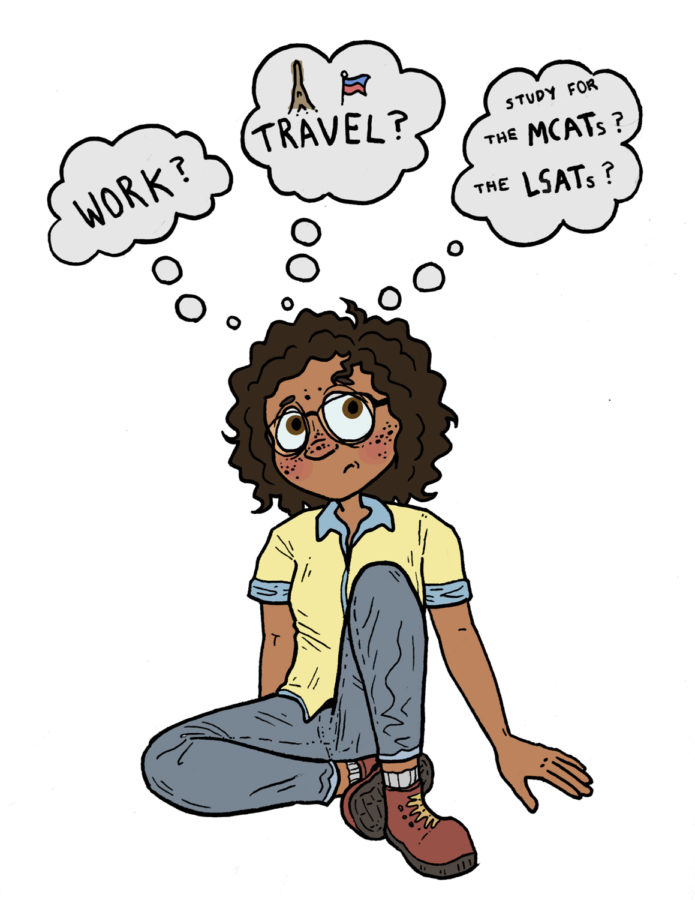Take a gap year before grad school
September 12, 2018
Time to start anew. Every year, black graduation caps fall haphazardly while “Sweet Caroline” plays in the background and nearly 4,000 graduates breathe a collective sigh of relief. But as the gold and blue confetti hits them, so does their uncertainty about their futures.
This uncertainty is quite common because the undergraduate years are a transient step — a bridge connecting the gap between high school and the realities of independent adult life. Many seniors plan to jump right into a career. Others spend their final two semesters frantically applying to grad school after grad school, praying they’ll find a place that wants them badly enough to pay for their post-grad studies.
But there is another choice — taking a gap year after graduation can provide a much-needed break for students who spent their previous 16 years immersed in academia. It can also help students discover a purpose outside of education and allow them to pursue opportunities they might’ve passed up otherwise.
According to a 2014 Pew Research Center poll, 50 percent of recent college graduates said their biggest regret was not gaining more work experience prior to graduation. This points to a lack of direction and foresight among college students and recent graduates. Since a last-semester major switch might not be wise, soon-to-be graduates should seek out various education and employment opportunities related to their major before trapping themselves in a job or school they don’t like.
(Graphic by Brian Gentry | Online Visual Editor)
A great way to gain work experience without committing to a career is to do an internship, which many companies offer for recent graduates.
Volunteer organizations such as AmeriCorps have internships in the United States as well as abroad, so students and graduates can fulfill their college dreams of spending a year abroad and slap a reputable internship on their resumés. Most of these programs often offer free housing, loan deferment and stipends toward graduate school or further education. Taking a gap year to explore these kinds of opportunities can help graduates set a foundation for career aspirations — and, of course, help them land all those entry-level positions that require a year of prior experience.
Anyone who needs extra help with their internship applications can visit Pitt’s Career Center, which provides everything from career planning to networking help to mock interviews.
For graduates looking to work in the private sector, it’s best to wait a bit and prepare before immediately trading the long graduation gown for a business suit. Although the switch from college classes to a cubicle may appear simple — we’ve all daydreamed about life without homework constantly looming over our heads — the professional world and the college bubble are very different and the sudden change will certainly affect graduates’ social lives.
Adult life doesn’t provide the same sense of community as college does, where seeing and interacting with people every day is just a fact of life. The move to a new area for a job opportunity or graduate school can strip recent graduates away from any sense of home or permanency that college may have provided — and the struggles of remaining financially self-sufficient in a new area only adds to the stress.
Finances are also a major issue for many students who decide to pursue a graduate degree. According to the National Center for Education Statistics, the average student loan debt for those who complete a master’s degree is about $66,000. So for an upcoming graduate who hasn’t reviewed their options, rushing into grad school can be a dangerous financial decision — especially since the average grad student pays 77 percent of tuition themselves. And since 36 percent of university students feel food insecure, it’s unlikely they’ll be able to pay for grad school without taking a year to save money — or to consider if grad school is even their best option.
Trying out a few different, short-term positions can help ease the financial burden of grad school and give students purpose and direction in their lives — a lack of which contributes to depression and anxiety in nearly one-third of college students. While there are no official stats on postgraduate depression, these mental health issues are unlikely to disappear in most students’ unsteady transitions to independent adult life.
That’s why it’s important to take a break and try new things. Who knows, some students might find they’re more satisfied at a sliding-scale medical clinic in an underprivileged area than at the corporate, for-profit hospital they’ve always dreamed about. It’s certainly possible they’ll even discover that grad school is no longer a necessity for achieving their goals.
A gap year can provide a graduate with much-needed insight into their true ambitions. It can also help combat the postgraduate depression and quarter-life crisis that are sure to set in after receiving a diploma.
Although it seems like getting a diploma and packing up that cap and gown should be the cliched end to some ‘80s coming-of-age movie, it’s really just the beginning of another part of life’s story.
Take a moment — or a year — to figure out the best path for your life. It can help to make the transition a lot less stressful.








